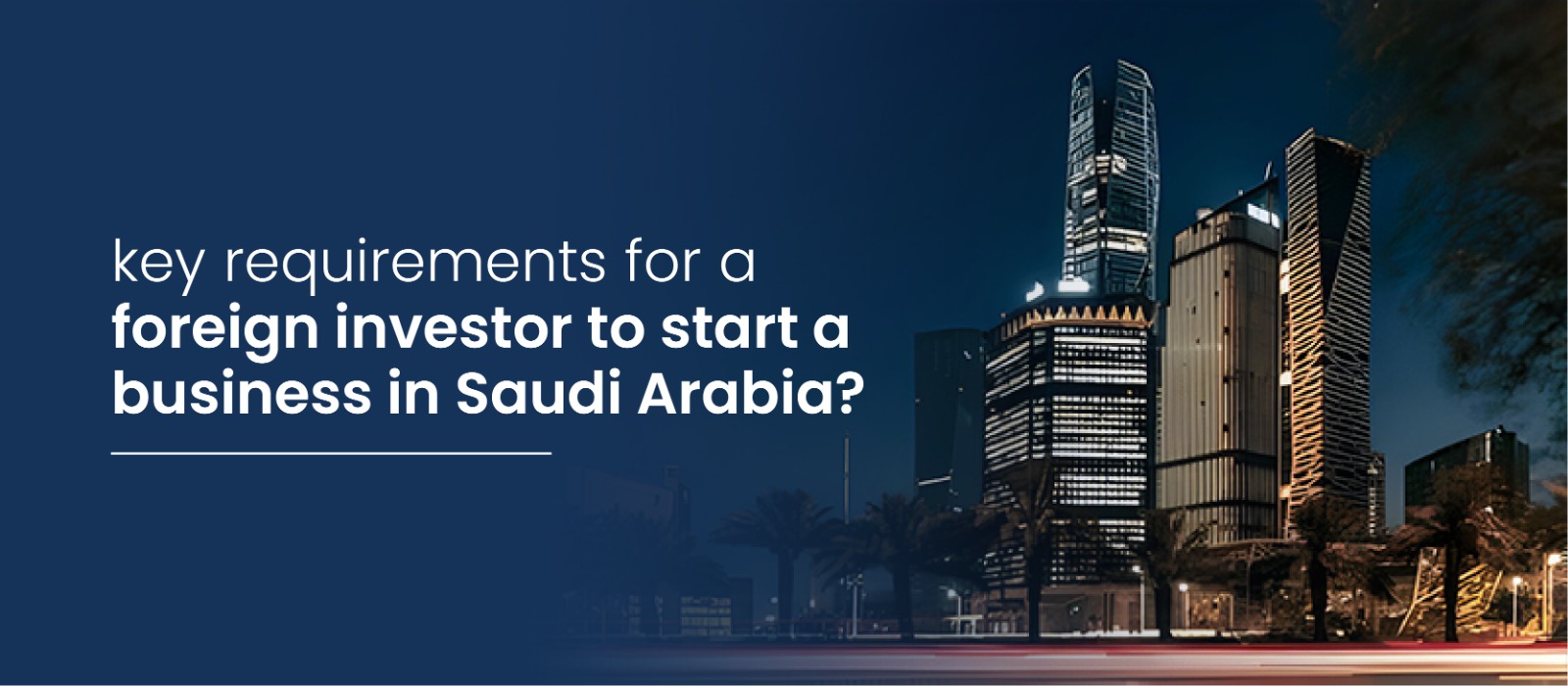Investment law in Saudi Arabia plays a major role in the projection of Saudi Arabia as a global hub for investment and business activities. It aims to create an investment-friendly environment in the country by simplifying licensing procedures, tax incentives and protection against expropriation.
Curious to know more about investment law in Saudi Arabia? Refer to the frequently asked questions on investment law in Saudi Arabia given below. These questions are answered by our experts which can help you understand the law better and ease your investment procedure in the country.
So let’s dive in!
1. What is Investment Law in Saudi Arabia?
The investment law in Saudi Arabia is a law that is aimed to create an investor-friendly environment and it is the law that governs both the domestic and foreign investments in the country. The investment law eases the process of investment in the country and provides legal protection to both foreigners and nationals alike to encourage business activities in the Kingdom. It covers various types of investments in the country, like fully foreign-owned ventures, joint ventures, and partnerships. As a law governing investments in the country, it also takes care of incentives like ease of doing business, tax exemptions, and access to industrial zones. The main aim of the investment law in the Kingdom of Saudi Arabia is to promote economic diversification and ensure equal treatment to all of its investors and contribute towards the broader development objectives of the country especially of those outlined in Vision 2030 initiatives.
2. What are the main objectives of Saudi Arabia’s Investment Law?
The main aim of the Investment Law in Saudi Arabia is the attraction of foreign direct investment and to boost the economic diversification of the country. The key objectives of the law include promotion of investments in non oil sectors like healthcare, technology, manufacturing, etc. and provide unhindered support to achieve the objectives of Vision 2030. It also aims to provide a transparent, investor-friendly framework which protects foreign investments in the country and fosters innovation and development and boost job opportunities in the Kingdom. In addition to all these, the Investment Law in the country also works towards the improvement of the business atmosphere in the Kingdom and boosts the economic sustainability of the Kingdom by encouraging investments in the country.
3. Who is responsible for regulating foreign investments in Saudi Arabia?
The main regulatory body responsible for the regulation of foreign investments in the country is The Ministry of Investment of Saudi Arabia (MISA). Previously known as the Saudi Arabian General Investment Authority (SAGIA), Ministry of Investment of Saudi Arabia (MISA) helps with the registration, license procurement, and functioning of international businesses within the Kingdom. It also acts as the key liaison between international investors and the government of Saudi Arabia, offering prompt advice, support, and insights about the on market opportunities and incentives in the Kingdom. MISA also ensures that the investments in the country are in alignment with the economic diversification effort of the country and in achieving the Vision 2030 goals.
4. What types of investments are encouraged under Saudi Arabia’s Investment Law?
Investment Law in Saudi Arabia encourages investments in the country’s core sectors that help the country ro achieve its Vision 2030 goals, like renewable energy, technology, tourism, healthcare, education and infrastructure, etc. It also promotes foreign direct investments (FDI) in the country which help the country to diversify its economy and create jobs and transfer the expertise of technology and knowledge to local industries. Greenfield investments and strategic partnerships which align with the goals of sustainable development and innovation are also promoted. The country mainly focuses on providing investments in the non oil sectors thus aiming to build a resilient and diversified economy.
5. Are there any restrictions on foreign ownership of businesses in Saudi Arabia?
Yes, though the country is open to 100% foreign ownership in certain industries, there are restrictions for 100% foreign ownerships in certain industries in Saudi Arabia. Specific sectors, like media, oil exploration, defence, etc are only meant for local ownerships and partnerships. Even the government has a “Negative List” of industries where the foreigners are strictly prohibited from having ownership of businesses. But in some cases, particularly in the sensitive or strategic areas, the real estate ownership is limited for foreigners. And in some industries, the government is liberal and and allows full ownership to foreigners in various key sectors thus attracting foreign investments and boosting its economic diversification efforts.
6. What is the role of the Saudi Arabian General Investment Authority (SAGIA) in investment activities?
The Saudi Arabian General Investment Authority (SAGIA), now known as the Ministry of Investment of Saudi Arabia (MISA), plays an important role in driving foreign investment into the Kingdom of Saudi Arabia. It acts like an important tool in driving foreign investments by promoting Saudi Arabia as an attractive destination for international investors. SAGIA helps to ease the process of investment process by providing comprehensive investment support like issuing licenses, providing guidance to investors through regulatory procedures, and offering information about investment opportunities in the country. It also collaborates with other government ministries and entities to facilitate business operations, by reducing the bureaucratic barriers, and improving the overall ease of doing business, in the Kingdom thus aligning the efforts of SAGIA with the broader goals of Vision 2030.

7. What are the key requirements for a foreign investor to start a business in Saudi Arabia?
Inorder to start a business in Saudi Arabia as a foreign investor in the country, you have to meet certain criterias. First, the investor have to obtain an investment license from the Ministry of Investment of Saudi Arabia (MISA). Also take care that your business must operate in only those sectors which are open for foreign investment in the country as some industries are restricted or require a Saudi partner to function in the country. Also a detailed business plan, necessary capital, and adherence to specific industry regulations are necessary. The foreign investor must also register the business with the Saudi Commercial Register, and obey with labour and taxation laws, because under the Saudization policy, a certain percentage of your employees should be Saudi nationals. Strict adherence to these requirements help the investor to be legally compliant and function easily in the Kingdom.
8. How does the Saudi Arabian government protect foreign investors' rights?
Several measures have been taken by the Government of Saudi Arabia to protect the rights of foreign investors in the Kingdom, promoting a stable and safe business environment. The legal protections given by the Saudi government protect the foreign investors from any non discriminatory treatment. Also, several laws are enacted to safeguard the property rights of investors and to ensure fair compensation in case of any expropriation, which is a rare case. Also the Kingdom has signed several international agreements, like the International Centre for Settlement of Investment Disputes (ICSID), to have a fair resolution of disputes. Clear contract enforcement, transparency in legal processes, and the availability of arbitration gives a fair protection to the foreign investors in the country thus making the country a safe destination for international businesses.
9. What are the tax incentives available for investors in Saudi Arabia?
A number of tax incentives are provided by Saudi Arabia to attract investments from foreigners and support their business growth in the country. Low corporate tax rate of 20%, and different tax rates for certain industries like oil and gas are examples of these. If the foreigners opted to build their business in the underdeveloped regions, then tax exemptions up to 10 years are provided to encourage the development. Exemptions in VAT and custom duties are also provided to encourage foreign investments. Also, personal income taxes are also not there in Saudi Arabia which makes the country a highly attractive destination for investors. Sufficient tax benefits are also provided to attract foreign investment in the country.
10. What recent changes have been made to Saudi Arabia’s Investment Law and how do they affect investors?
There have been a number of amendments to the investment law in Saudi Arabia which introduced several reforms making the country a paradise for the foreign investors. Simplification of the licensing process is one such reform, making it a good move to speed up the process of investment process. The law has made many liberal changes as it provides access to previously restricted sectors like real estate and certain financial services, to enhance foreign participation. In addition, these reforms boost the protection of investors by providing transparency, clearer regulations, and ensuring fair treatment in the resolution of disputes. These changes enhance the investment potential of the country and help it to achieve the Vision 2030 goals.
11. Are there any sector-specific regulations investors should be aware of?
Yes, in industries like energy, telecom, and defense, Saudi Arabia has sector-specific regulations. While industries like oil and gas have foreign ownership restrictions, industries like education, real estate, and healthcare are more open to foreign investment. It is the Saudi Arabian General Investment Authority (SAGIA) responsible for the sector specific regulations and helping the investors to be compliant towards the local laws. So as investors it is necessary to review the negative list, and review the regulatory framework for each sector.
12. What is the process for obtaining a foreign investment license in Saudi Arabia?
In order to get a foreign investment license in Saudi Arabia, the investors should apply through the Ministry of Investment of Saudi Arabia (MISA). Then you have to submit required documents, which includes a detailed business plan, financial statements, and necessary information about the investors. The application would be then reviewed to ensure its compliance towards laws and investment policies in Saudi Arabia. Approval of the application depends upon the accuracy of the information shared. The process of obtaining an investment license can take up to several weeks, depending upon the complexity of the investment made and sector-specific regulations. However MISA provides support throughout the process for investors .
13. How can investors resolve disputes under Saudi Arabian Investment Law?
There are several mechanisms available in Saudi Arabia for resolving investment disputes in the country. Investors in Saudi Arabia can pursue arbitration through the Saudi Center for Commercial Arbitration (SCCA), which provides international best practices. Also, in Saudi Arabia, if the disputes involve any local laws or public policy, then it can be solved through the courts. Bilateral investment treaties (BITs) involved with other countries also provide protections for foreign investors and give an avenue for the resolution of any disputes. In order to ensure disputes are settled efficiently, Saudi Arabia’s legal system provides mediation and conciliation. Also the investors are told to include clauses on dispute resolution in contracts and seek legal counsel to navigate the process.
14. How does Saudi Arabia’s Investment Law affect real estate investments?
Investment Law in Saudi Arabia allows the foreign investors to conduct real estate business activities, but they are subject to regulations. Investors are allowed to own property for industrial, commercial and residential projects in areas including special economic zones or cities like Riyadh and Jeddah. But restrictions are applied on certain areas like the holy cities of Mecca and Medina. The main aim of the law is the attraction of foreign investment for the development of real estate business in the country, particularly in sectors like tourism, housing, and infrastructure projects, and this is in alignment with the goals of Vision 2030. Consulting legal experts would help you gain better insights on zoning laws, ownership restrictions, and regulatory requirements before investing.
15. How does Saudi Arabia’s Investment Law align with international investment standards?
By promoting equal treatment, transparency and protection of foreign investors the investment law in Saudi Arabia aligns with the international standards in investment. It is in adherence with the World Trade Organization (WTO) agreements and various bilateral investment treaties (BITs), which are providing protections against expropriation and fair compensation for investors in case of any disputes. Also the law promotes corporate governance, intellectual property rights, and dispute resolution in compliance with the global practices. Through Vision 2030, Saudi Arabia is trying to polish its legal framework so that it becomes a favourable destination for foreign direct investment (FDI) by aligning the rules and regulations with international norms and fostering a business-friendly environment.
16. What environmental regulations must investors comply with in Saudi Arabia?
There are certain environmental regulations the Investors in Saudi Arabia must adhere to which are set by the General Authority for Meteorology and Environmental Protection (GAMEP). As an investor you have to obtain environmental permits, conduct impact assessments, and ensure that your projects do not cause any harm to natural ecosystems. Foreign businesses must also comply with the pollution control, waste management, and sustainable resource use guidelines. Also the Vision 2030 of Saudi Arabia also envisions following environmentally responsible practices, with a focus on, water conservation, renewable energy, and reducing carbon emissions. Non-compliance of these environmental regulations can lead to fines, legal actions, delays in projects, etc. making it necessary for the investors to have environmental considerations in their business operations in Saudi Arabia.
17. Are there any special economic zones in Saudi Arabia with different investment rules?
Yes, there are special economic zones (SEZs) in Saudi Arabia which are designed to attract foreign investment by providing unique incentives. These zones are different from other parts of the country as they have simplified regulatory frameworks, provide tax exemptions, and have custom duty benefits. King Abdullah Economic City (KAEC), Jazan Economic City, and NEOM, a futuristic megacity, are the key SEZs in the country. The major aim of these zones are the diversification of the economy, by providing customised opportunities in various sectors like manufacturing, technology and logistics. Special Economic Zones in Saudi Arabia plays a crucial role in the enhancement of Saudi Arabia as a global investment hub and by offering various relaxations in labour laws, streamlined licensing procedures, and sector-specific incentives, Saudi Arabia is projected as a promising land for investments.
18. What is the impact of Saudi Arabia’s Investment Law on joint ventures and partnerships?
The Investment Law of Saudi Arabia promotes a great environment for the joint ventures and partnerships in the country by offering the foreign investors the ability to own up to 100% equity in certain sectors. By simplifying the procedure of formation of joint ventures and providing legal protections for investors, the investment law in Saudi Arabia is encouraging the collaboration between local and international businesses . It also provides the repatriation of profits of foreign partners freely. Also, the law provides dispute resolution, transparency and equal treatment for foreign and local investors, making joint ventures an attractive option for foreign businesses entering the Saudi market.
19. What are the penalties for non-compliance with Saudi Arabia’s Investment Law?
Investment law in Saudi Arabia is an integral part of the governance of the country, and non compliance to the same would result in a range of penalties, including fines, cancellation of investment certificates, suspension of business licenses, etc. Any serious violations in the investment law may also result in certain legal actions, like the termination of contract or revocation of investor rights, etc. It is the Saudi Arabian General Investment Authority (SAGIA) responsible for overseeing the enforcement of investment law and ensuring that companies meet legal, financial, and operational requirements set by the law. In cases of repeated violations, the businesses might face restrictions on future investments in the country. By strictly following the regulations, ensuring the accurate submission of documents, and maintaining transparency in operations, the investors can avoid penalties.
20. How does Saudi Arabia’s Vision 2030 influence investment opportunities in the country?
The major aim of the strategic plan of Vision 2030 is the diversification of the economy of Saudi Arabia beyond oil. It provides great investment opportunities in various sectors like tourism, renewable energy, technology, and infrastructure. The plan also aims to promote innovation, privatization, and partnerships between local and foreign investors. Vision 2030 has led to many reforms in the law and regulations of the country like easing of restrictions on foreign ownership in the country, establishment of special economic zones, and enhancement of the business environment. Also the major projects like NEOM and the Red Sea Project, also attracts international investors as it provides lucrative prospects for the investors.

























